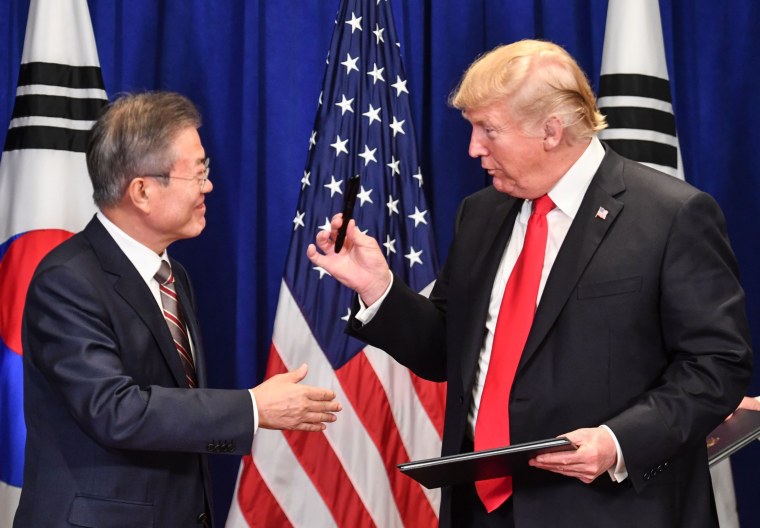For reasons the White House has struggled to explain, Donald Trump has spent much of his presidency alienating and insulting our South Korean allies. As regular readers know, this has been going on for a while.
Just a few months into his presidency, Trump lied about dispatching an “armada,” led by an aircraft carrier, towards the peninsula, and South Koreans weren’t pleased. When Trump falsely said the Korean Peninsula “used to be a part of China,” that didn’t go over especially well, either.
In May 2017, Trump made matters vastly worse, condemning the U.S.-Korea Free Trade Agreement, known as Korus, and threatening to trash the deal. He then said he wanted to deploy a missile-defense system – Terminal High-Altitude Air Defense (Thaad) – in South Korea to help protect against a North Korean attack, but only if South Korea pays for the technology. (Then-White House National Security Advisor H.R. McMaster quietly let officials in Seoul know they should ignore the American president’s bluster.)
A year and a half ago, Trump said at a fundraiser, in reference to South Korea, "Our allies care about themselves. They don't care about us."
This posture took a more drastic turn late last week, as the Associated Press reported:
U.S. Defense Secretary Mark Esper on Friday pressed Washington's case that longtime ally South Korea must pay a bigger share of the cost of having U.S. troops on its soil."This is a very strong alliance we have, but Korea is a wealthy country and could and should pay more to help offset the cost of defense," Esper told a joint news conference with his South Korean counterpart, Jeong Kyeong-doo.Esper said that while South Korea has provided "a fair amount of support in the past," it is important to point out that "most of that money stays here in this country -- easily over 90% of that money stays here in Korea, it does not go to the United States."
There are competing accounts on the precise figures, but this year, Seoul will pay nearly $1 billion for the presence of roughly 28,000 U.S. troops. Trump wants to hike that figure to around $4.7 billion -- a figure that CNN's report said "came out of thin air."
The same report added, "The price hike has frustrated Pentagon officials and deeply concerned Republican and Democratic lawmakers, according to military officials and congressional aides. It has angered and unnerved Seoul, where leaders are questioning U.S. commitment to their alliance and wondering whether Trump will pull U.S. forces if they don't pay up."
Vipin Narang, an associate professor at MIT who follows the Korean peninsula, summarizing South Korean uncertainty about the U.S., was quoted saying, "Nothing says I love you like a shakedown."
Though I don't imagine this will make Seoul feel any better, Foreign Policy reported late Friday that South Korea isn't the only one: the Trump administration has reportedly "asked Tokyo to pay roughly four times as much per year to offset the costs of stationing more than 50,000 U.S. troops there."
This is bizarre for a variety of reasons.
For one thing, Trump appears to be approaching some of our closest allies in the Asia-Pacific region and talking to them as if the United States is running a protection racket. At a time when the Republican White House seems overly eager to make North Korea happy -- including indefinitely postponing a joint military exercise with South Korea as an "act of goodwill" toward the rogue nuclear-armed dictatorship -- Trump and his team are giving our friends reason to question the United States' commitment to longstanding partnerships.
There's no strategic reason for the Republican to position the United States as an unreliable ally, but that's precisely what Trump seems eager to do.
What's more, I'm not sure the amateur president fully appreciates the point of the U.S. military presence in the region. In June 2018, Rachel spoke on the air to retired four-star Navy Admiral James Stavridis, a former supreme allied commander of NATO, and he said something I found memorable.
"We ought to remember," Stavridis explained, "our troops are there, not as an act of goodwill toward South Korea, they're there to enhance U.S. influence in the region, to ensure that we keep those sea-lanes of communication open, that our trade can flow freely, that we have a voice in the events there.... They're not there as an act of goodwill; they're there to accomplish U.S. national security objectives."
And now Trump reportedly expects our allies to pony up -- a lot -- to help us accomplish our national security objectives, all while throwing around numbers he doesn't seem to understand.
It's going to take time and no small amount of diplomatic effort to undo damage like this.
